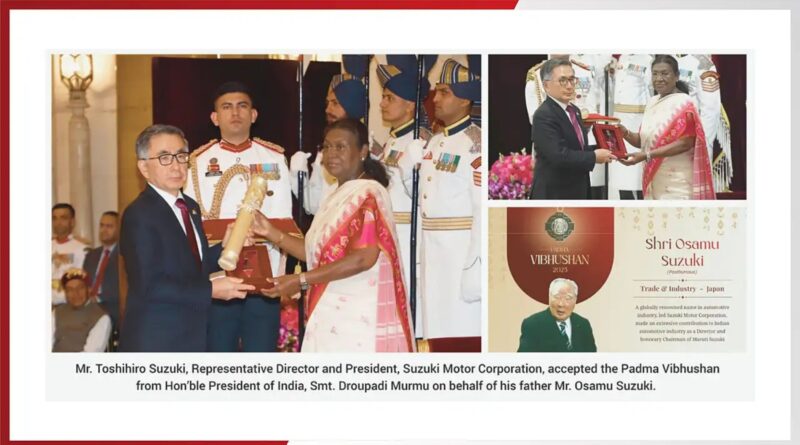Toshihiro Suzuki Accepts Padma Vibhushan Honoring Osamu Suzuki
Toshihiro Suzuki Honored at Padma Awards: A Tribute to Legacy and Leadership
Every award has a story behind it—and the recent Padma Vibhushan awarded posthumously to Osamu Suzuki is no exception.
The honor was accepted by his son, Toshihiro Suzuki, the current CEO of Suzuki Motor Corporation. But beyond the medal and recognition lies a deeper story of values, long-term vision, and a connection between India and Japan that has spanned decades.
So, who was Osamu Suzuki and why does this award matter?
Osamu Suzuki’s Global Legacy
Osamu Suzuki led Suzuki Motor Corporation for more than four decades. Under his leadership, the company grew from a small Japanese carmaker to a global automotive giant.
One of his biggest contributions? Bringing Maruti Suzuki to India.
Think back to the 1980s. India’s car market was just starting to develop. Public transport was crowded and inefficient. Families needed an option that was reliable, affordable, and fuel-efficient.
That’s when Maruti 800 entered Indian roads through a partnership between Indian government-owned Maruti and Japan’s Suzuki Motor Corporation.
This move didn’t just bring a car to India—it changed how people moved, worked, and lived.
A Pioneering Vision
Osamu Suzuki saw potential in India when others didn’t. Some of his major contributions include:
- Introducing compact cars to Indian roads: The Maruti 800 reshaped the auto industry with its affordability.
- Creating manufacturing jobs: Maruti Suzuki’s plants became training grounds for thousands of workers.
- Improving technologies: He focused on fuel efficiency, smart engineering, and user-friendly design before they became industry norms.
His leadership style favored long-term commitment over short-term profits—a rare approach in today’s business world.
Why the Padma Vibhushan Is Significant
The Padma Awards are India’s highest civilian honors. Given by the Government of India, these awards recognize extraordinary service across fields like arts, public affairs, science, and industry.
What makes the Padma Vibhushan special?
Second only to the Bharat Ratna, the Padma Vibhushan is reserved for individuals who’ve made lifelong contributions to society. Past recipients include spiritual leaders, scientists, and artists.
And now, Osamu Suzuki joins that list—for strengthening Indo-Japanese ties and leaving a lasting impact on Indian industry.
For many Indians, owning a Maruti car isn’t just about transport—it represents aspiration, progress, and independence.
Toshihiro Suzuki Accepts the Award on Behalf of His Father
The ceremony took place at Rashtrapati Bhavan in New Delhi.
President Droupadi Murmu handed over the award to Toshihiro Suzuki in a formal yet emotional ceremony. The moment symbolized more than recognition—it highlighted the deep-rooted association between Suzuki Motor Corporation and India.
Imagine standing on that stage, receiving one of India’s highest honors for your father. That’s what Toshihiro experienced. A sense of pride, gratitude, and a continuation of purpose.
What Toshihiro Said
Toshihiro showed humility and deep respect for India. Speaking to the media, he said he was honored to accept the award on behalf of his late father and thanked the Indian people for their enduring trust in the Suzuki brand.
He emphasized how India holds a special place in Suzuki’s journey—and how the relationship will continue to evolve.
Maruti Suzuki’s Role in India: More Than Just Cars
When you hear “Maruti Suzuki,” what comes to mind?
Probably trusted cars like the Alto, WagonR, Swift, or Dzire.
But Maruti’s influence goes beyond car models. It represents changing lifestyles, better accessibility to technology, and local employment growth.
Highlights of Maruti Suzuki’s Role in India:
- Job creation: Employs thousands directly, and many more indirectly through dealers, service providers, and parts manufacturers.
- Local manufacturing: Major contributor to India’s ‘Make in India’ mission, with over 90% of parts locally sourced.
- Training and upskilling: Operates training centers to equip mechanics and engineers with modern skills.
- Export strength: Produces vehicles in India for over 100 countries worldwide.
Wherever you travel in India—from small towns to bustling cities—there’s a good chance you’ll spot a Maruti Suzuki in motion.
Suzuki’s Ongoing Commitment to India
This award reflects more than a past contribution. It signals the commitment Suzuki Motor has for India’s future.
Toshihiro Suzuki has continued his father’s work by strengthening the company’s presence in India and adapting to new trends like electric vehicles (EVs) and hybrid models.
In March 2022, Suzuki Motor Corporation announced a major investment plan worth ₹10,440 crore to manufacture EVs and batteries in India.
What does this mean for you?
It means your next Maruti car could be electric. It means more job opportunities. It means technology that’s clean and efficient.
India’s future in the global auto market is growing, and Suzuki plans to be a key part of that journey.
A Look at the Man Behind the Machines
What made Osamu Suzuki different was not just his business success—but his mindset.
He often said that he wanted Suzuki to be a “people’s car company.” Not a luxury brand, not a high-gloss nameplate—but a company that served the masses.
Many families bought their first car from Maruti Suzuki. It might’ve been a big investment, a financial milestone, or a gift to a loved one.
That emotional connection runs deep.
Remember the Maruti 800?
It wasn’t just a car. It meant freedom for young professionals, convenience for families, and pride for small-town entrepreneurs.
That’s the kind of impact Suzuki, under Osamu’s leadership, created.
Looking Forward: What This Award Represents
Yes, the Padma Vibhushan honors Osamu Suzuki for his monumental role in India’s automotive industry.
But more than a medal, it’s a recognition of a shared history. Of how one man helped build a bridge between two nations—through technology, trust, and teamwork.
It also sets a benchmark.
What can today’s business leaders learn?
- Think long term: Sustainable growth beats quick wins.
- Respect local culture: Understand the market, listen to people, and grow organically.
- Lead with purpose: Focus on solving real-world problems, not just boosting profits.
And for the rest of us, it reminds us of how far we’ve come. How the right partnership, guided by vision, can leave a lasting impression.
Final Thoughts
Toshihiro Suzuki’s acceptance of the Padma Vibhushan is much more than a family tribute. It’s a national acknowledgment of the role Suzuki has played in India’s industrial journey.
Osamu Suzuki believed in India when not many did.
Today, millions of Indians believe in Suzuki—because of the values he instilled.
So next time you’re on the road and spot a Maruti car, you’ll know there’s more behind that badge than just engineering. There’s a vision, a legacy, and a commitment that has stood the test of time.









